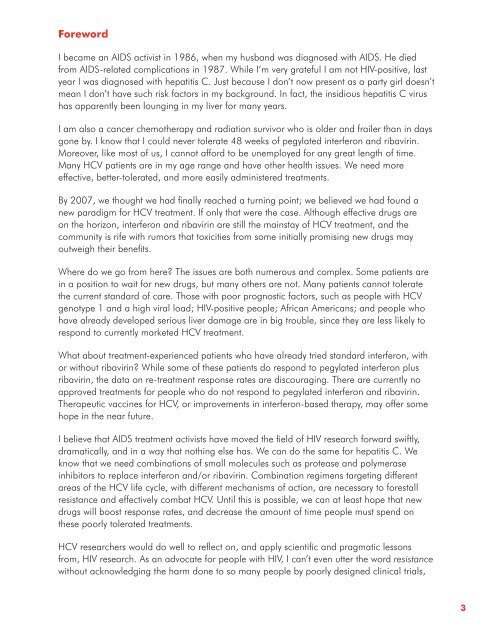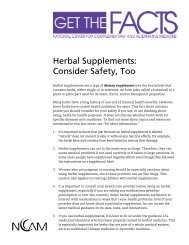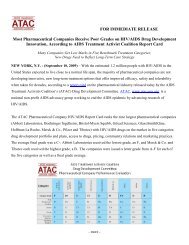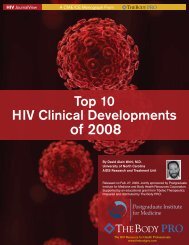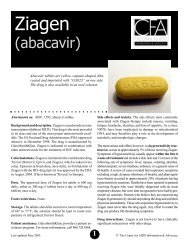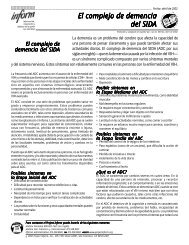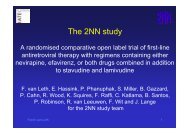Hepatitis C: New Treatments in the Pipeline - CD8 T cells - The Body
Hepatitis C: New Treatments in the Pipeline - CD8 T cells - The Body
Hepatitis C: New Treatments in the Pipeline - CD8 T cells - The Body
Create successful ePaper yourself
Turn your PDF publications into a flip-book with our unique Google optimized e-Paper software.
Foreword<br />
I became an AIDS activist <strong>in</strong> 1986, when my husband was diagnosed with AIDS. He died<br />
from AIDS-related complications <strong>in</strong> 1987. While I’m very grateful I am not HIV-positive, last<br />
year I was diagnosed with hepatitis C. Just because I don’t now present as a party girl doesn’t<br />
mean I don’t have such risk factors <strong>in</strong> my background. In fact, <strong>the</strong> <strong>in</strong>sidious hepatitis C virus<br />
has apparently been loung<strong>in</strong>g <strong>in</strong> my liver for many years.<br />
I am also a cancer chemo<strong>the</strong>rapy and radiation survivor who is older and frailer than <strong>in</strong> days<br />
gone by. I know that I could never tolerate 48 weeks of pegylated <strong>in</strong>terferon and ribavir<strong>in</strong>.<br />
Moreover, like most of us, I cannot afford to be unemployed for any great length of time.<br />
Many HCV patients are <strong>in</strong> my age range and have o<strong>the</strong>r health issues. We need more<br />
effective, better-tolerated, and more easily adm<strong>in</strong>istered treatments.<br />
By 2007, we thought we had f<strong>in</strong>ally reached a turn<strong>in</strong>g po<strong>in</strong>t; we believed we had found a<br />
new paradigm for HCV treatment. If only that were <strong>the</strong> case. Although effective drugs are<br />
on <strong>the</strong> horizon, <strong>in</strong>terferon and ribavir<strong>in</strong> are still <strong>the</strong> ma<strong>in</strong>stay of HCV treatment, and <strong>the</strong><br />
community is rife with rumors that toxicities from some <strong>in</strong>itially promis<strong>in</strong>g new drugs may<br />
outweigh <strong>the</strong>ir benefits.<br />
Where do we go from here? <strong>The</strong> issues are both numerous and complex. Some patients are<br />
<strong>in</strong> a position to wait for new drugs, but many o<strong>the</strong>rs are not. Many patients cannot tolerate<br />
<strong>the</strong> current standard of care. Those with poor prognostic factors, such as people with HCV<br />
genotype 1 and a high viral load; HIV-positive people; African Americans; and people who<br />
have already developed serious liver damage are <strong>in</strong> big trouble, s<strong>in</strong>ce <strong>the</strong>y are less likely to<br />
respond to currently marketed HCV treatment.<br />
What about treatment-experienced patients who have already tried standard <strong>in</strong>terferon, with<br />
or without ribavir<strong>in</strong>? While some of <strong>the</strong>se patients do respond to pegylated <strong>in</strong>terferon plus<br />
ribavir<strong>in</strong>, <strong>the</strong> data on re-treatment response rates are discourag<strong>in</strong>g. <strong>The</strong>re are currently no<br />
approved treatments for people who do not respond to pegylated <strong>in</strong>terferon and ribavir<strong>in</strong>.<br />
<strong>The</strong>rapeutic vacc<strong>in</strong>es for HCV, or improvements <strong>in</strong> <strong>in</strong>terferon-based <strong>the</strong>rapy, may offer some<br />
hope <strong>in</strong> <strong>the</strong> near future.<br />
I believe that AIDS treatment activists have moved <strong>the</strong> field of HIV research forward swiftly,<br />
dramatically, and <strong>in</strong> a way that noth<strong>in</strong>g else has. We can do <strong>the</strong> same for hepatitis C. We<br />
know that we need comb<strong>in</strong>ations of small molecules such as protease and polymerase<br />
<strong>in</strong>hibitors to replace <strong>in</strong>terferon and/or ribavir<strong>in</strong>. Comb<strong>in</strong>ation regimens target<strong>in</strong>g different<br />
areas of <strong>the</strong> HCV life cycle, with different mechanisms of action, are necessary to forestall<br />
resistance and effectively combat HCV. Until this is possible, we can at least hope that new<br />
drugs will boost response rates, and decrease <strong>the</strong> amount of time people must spend on<br />
<strong>the</strong>se poorly tolerated treatments.<br />
HCV researchers would do well to reflect on, and apply scientific and pragmatic lessons<br />
from, HIV research. As an advocate for people with HIV, I can’t even utter <strong>the</strong> word resistance<br />
without acknowledg<strong>in</strong>g <strong>the</strong> harm done to so many people by poorly designed cl<strong>in</strong>ical trials,<br />
3


